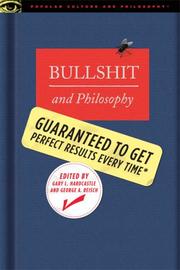| Listing 1 - 8 of 8 |
Sort by
|

ISBN: 0521546893 9780521837972 0521837979 9780521546898 9780511610318 0511115571 9780511115578 0511610319 1280415770 9781280415777 1107139899 9786610415779 0511197349 0511171587 0511298684 0511115024 Year: 2005 Publisher: Cambridge ; New York : Cambridge University Press,
Abstract | Keywords | Export | Availability | Bookmark
 Loading...
Loading...Choose an application
- Reference Manager
- EndNote
- RefWorks (Direct export to RefWorks)
This intriguing and ground-breaking book is the first in-depth study of the development of philosophy of science in the United States during the Cold War. It documents the political vitality of logical empiricism and Otto Neurath's Unity of Science Movement when these projects emigrated to the US in the 1930s and follows their de-politicization by a convergence of intellectual, cultural and political forces in the 1950s. Students of logical empiricism and the Vienna Circle treat these as strictly intellectual non-political projects. In fact, the refugee philosophers of science were highly active politically and debated questions about values inside and outside science, as a result of which their philosophy of science was scrutinized politically both from within and without the profession, by such institutions as J. Edgar Hoover's FBI. It will prove absorbing reading to philosophers and historians of science, intellectual historians, and scholars of Cold War studies.
Cold War --- Logical positivism. --- Science --- Influence. --- Philosophy --- History --- United States --- Intellectual life --- Logical positivism --- Philosophy of Science --- Influence --- Logical empiricism --- Neo-empiricism --- Neo-positivism --- Physicalism --- Positivism, Logical --- Unity of science movement --- Language and logic --- Logic --- Meaning (Psychology) --- Positivism --- Reductionism --- Relationism --- Analysis (Philosophy) --- Verification (Empiricism) --- Vienna circle --- Arts and Humanities --- Science - Philosophy - History - 20th century --- Cold War - Influence --- United States - Intellectual life - 20th century
Book
ISBN: 1438473680 9781438473680 9781438473673 1438473672 Year: 2019 Publisher: Albany : State University of New York Press,
Abstract | Keywords | Export | Availability | Bookmark
 Loading...
Loading...Choose an application
- Reference Manager
- EndNote
- RefWorks (Direct export to RefWorks)
The Politics of Paradigms shows that America's most famous and influential book about science, The Structure of Scientific Revolutions of 1962, was inspired and shaped by Thomas Kuhn's political interests, his relationship with the influential cold warrior James Bryant Conant, and America's McCarthy-era struggle to resist and defeat totalitarian ideology. Through detailed archival research, Reisch shows how Kuhn's well-known theories of paradigms, crises, and scientific revolutions emerged from within urgent political worries—on campus and in the public sphere—about the invisible, unconscious powers of ideology, language, and history to shape the human mind and its experience of the world.
Science --- Cold War --- World politics --- Science and society --- Sociology of science --- Normal science --- Philosophy of science --- Philosophy. --- Social aspects. --- Kuhn, Thomas S. --- Conant, James Bryant, --- Conant, James B. --- Conant, J. B. --- كننت، جيمس براينت --- كوننث، جايمس ب. --- Kūnant, Jaymz --- کوننت، جيمز --- Kʻo-en, --- Kʻu-en, --- Kuhn, T. S. --- Kʻung-en, --- קון, תומאס ס. --- كون، توماس --- Kuhn, Thomas Samuel,

ISBN: 0812696115 9780812696110 Year: 2006 Publisher: Chicago (Ill.) : Open Court,
Abstract | Keywords | Export | Availability | Bookmark
 Loading...
Loading...Choose an application
- Reference Manager
- EndNote
- RefWorks (Direct export to RefWorks)
"Sixteen essays offer discussions, interpretations, and criticisms related to Harry G. Frankfurt's essay "On Bullshit" and other philosophical work on bullshit. Topics addressed include: the definition of bullshit; the ethics and epistemology of bullshit; and the role of bullshit in contemporary culture"--Provided by publisher.
Book
ISBN: 9781438485515 Year: 2021 Publisher: Albany : State University of New York Press
Abstract | Keywords | Export | Availability | Bookmark
 Loading...
Loading...Choose an application
- Reference Manager
- EndNote
- RefWorks (Direct export to RefWorks)
Book
ISBN: 1438485530 9781438485539 9781438485515 Year: 2021 Publisher: Albany, New York : State University of New York Press,
Abstract | Keywords | Export | Availability | Bookmark
 Loading...
Loading...Choose an application
- Reference Manager
- EndNote
- RefWorks (Direct export to RefWorks)
"The once-lost introduction to the philosophy of science by Philipp Frank (1884-1966), a leading member of the Vienna circle of philosophers and biographer of Albert Einstein"--
Science --- Science and the humanities. --- Philosophy. --- Frank, Philipp,
Book
ISBN: 9781438485522 1438485522 Year: 2022 Publisher: Albany: Suny press,
Abstract | Keywords | Export | Availability | Bookmark
 Loading...
Loading...Choose an application
- Reference Manager
- EndNote
- RefWorks (Direct export to RefWorks)
"The once-lost introduction to the philosophy of science by Philipp Frank (1884-1966), a leading member of the Vienna circle of philosophers and biographer of Albert Einstein."
Science --- Science and the humanities --- Frank, Philipp, - 1884-1966
Book
ISBN: 0812698517 9780812698510 9780812698480 0812698487 Year: 2014 Publisher: Chicago, Illinois : Open Court,
Abstract | Keywords | Export | Availability | Bookmark
 Loading...
Loading...Choose an application
- Reference Manager
- EndNote
- RefWorks (Direct export to RefWorks)
The Finnish philosopher Eino Kaila (1890-1958) wrote a classic statement of Logical Empiricism. He had experienced the foundational debates of the Vienna Circle, invited by Moritz Schlick, during the early summer of 1929. Kaila was a keen follower of the further developments of the Circle. His synoptic presentation and analysis of the basic themes, or ""theses"", of the movement was based on his lectures as professor of theoretical philosophy at the University of Helsinki.The work appeared as a book in Finnish in 1939. A Swedish translation by Georg Henrik von Wright followed imme
Book
ISBN: 9780812698480 Year: 2014 Publisher: Chicago Open court
Abstract | Keywords | Export | Availability | Bookmark
 Loading...
Loading...Choose an application
- Reference Manager
- EndNote
- RefWorks (Direct export to RefWorks)
| Listing 1 - 8 of 8 |
Sort by
|

 Search
Search Feedback
Feedback About UniCat
About UniCat  Help
Help News
News